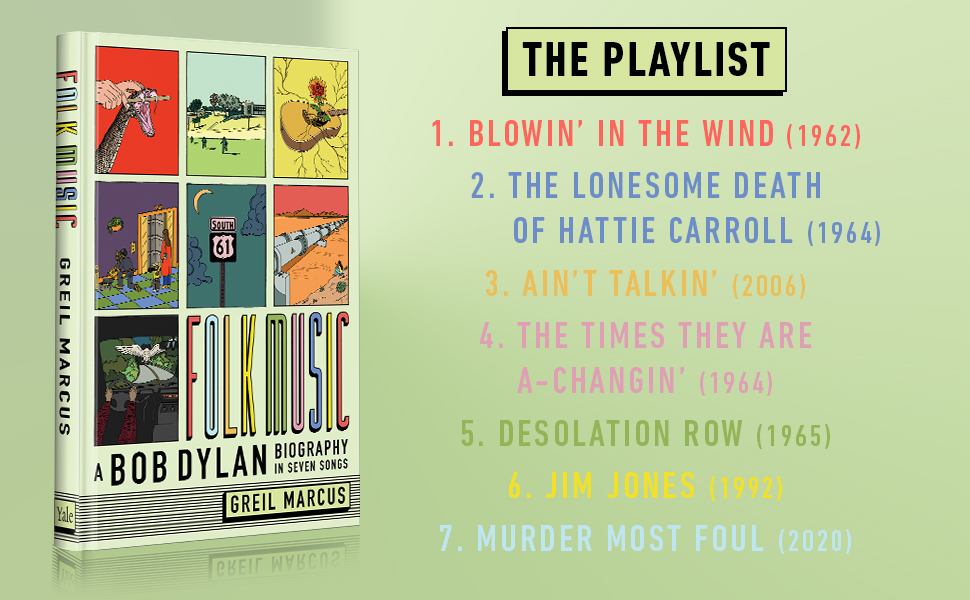
In 2002 before an upcoming Bob Dylan concert, Buffalo News music columnist Jeff Miers wrote: “The voice of the promise of the ’60s counter-culture. The guy who forced folk into bed with rock, who donned makeup in the ’70s and disappeared into a haze of substance abuse, who emerged to find Jay-sus, who was written off as a has-been by the end of the ’80s, and who suddenly shifted gears and released some of the strongest music of his career beginning in the late ’90s.”
Greil Marcus, who has written several books about Bob Dylan and his music, returns with this “biography” of Dylan’s “folk music.” Marcus analyzes seven of Dylan’s songs and discusses the other artists who have covered the songs, how the songs were recorded, how the songs came to be written, and what was going on in Dylan’s life that might have affected the songs.
If you’re a Bob Dylan fan, you’ll find all the details Marcus delivers both fascinating and enlightening. Dylan is a complex artist and the backstories of these songs reveals just some of his secrets. GRADE: A
TABLE OF CONTENTS:
Biography — 1
In Other Lives — 5
Blowin’ in the Wind/1962 — 11
The Lonesome Death of Hattie Carroll/1964 — 85
Ain’t Tal kin’/2006 — 119
The Times They Are A-Changin’ / 1964 — 157
Desolation Row / 1965 — 167
Jim Jones / 1992 — 177
Murder Most Foul / 2020 — 227
Notes — 241
Acknowledgments — 255
Credits — 259
Index — 261
I have read a lot of Greil Marcus beginning with Mystery Train. I have this on reserve at the library. Dylan’s work in this century has been surprisingly good-except for his cd of standards.
Steve, like you I’ve read a lot of Greil Marcus books and enjoyed them all. I totally agree with you on that Dylan CD of “standards.” Unlistenable!
I’m interested in this one…I think I better let Santa know!
Deb, FOLK MUSIC is a must-read for Dylan fans!
Interesting reviews of fascinating books, films or whatever — that’s what keeps me coming back here!
Dan, and we’re all glad you keep coming back! I like variety in my books, films, or whatever!
I liked Marcus more before I started reading his work on ’80s-onward music…but I imagine he writed reasonably well about Dylan, still.
Todd, Greil Marcus has written a dozen books on Bob Dylan. He keeps finding something new and interesting to wrote about Dylan.
My Dylan studies must be slipping. I’m pretty sure I’ve never even heard “Ain’t Talkin'” or “Jim Jones”. But I’ll read just about anything by Marcus.
Michael, I’ve read almost all of Greil Marcus’s books over the years. He sometimes takes a Deep Dive into obscure songs!
I’ve read some of Marcus’s books, starting with mystery train. Had no idea he’d written that much on Dylan. I once read something Dylan wrote about “Blowin’ in the Wind,” how when he listened to it he found it hard to believe that he’s written it, or something along those lines.
Jeff, I recall that interview, too. Of course, sometimes I see articles I wrote over 40 years ago–the Introduction to THE GIRL IN 304 is a good example–and it seems like a different person wrote it.
Isn’t it amazing how much there is to say about him? I know his career is very long now but I can’t imagine how you could find new ground to plow by now.
Patti, Greil Marcus and others go down the Rabbit Holes of Bob Dylan’s life and music and always turn up something new.
I have to admit that I’ve been only interested in the “early” Dylan songs like Desolation Row and Where have all the flowers gone was a hmn for or peace movement. So in the 60s he was a hero for us, but later? Somehow his songs didn’t touch us anymore.
A bit OT:
Around 2010 Bob had an open air concert in my hometown Tübingen – there probably were a lot of the university’s 20 000 students at the concert.
We were in Hungary at the time but friends who were there told me that they were totally frustrated and disappointed.
The acoustic system wasn’t so good, Dylan seemed strange and the worst point:
It was windy and raining most of the time and for security reasons people had to leave their umbrellas outside the arena so they got soaking wet …
Wolf, like you I prefer the Dylan music from 1965 to 1972.
Dylan didn’t write Where Have All the Flowers Gone.
My favorite Dylan starts at Another Side and goes on through through to Blood On the Tracks.
Steve, of course you’re right!
Sorry, I was thinking of Blowing in the Wind of course – these Dylan songs and Pete Seeger’s Where have all the flowers gone just defined our “Freedom” movement in Germany in the sixties when we finally got rid of our “Clerical Fascists”.